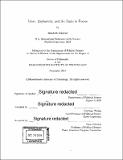Islam, exclusivity, and the state in France
Author(s)
Dekeyser, Elizabeth(Elizabeth A.)
Download1144177072-MIT.pdf (19.14Mb)
Other Contributors
Massachusetts Institute of Technology. Department of Political Science.
Advisor
Kathleen Thelen.
Terms of use
Metadata
Show full item recordAbstract
This dissertation examines why individuals believe that their religious identity is incompatible with mainstream identities. Using the case of Islam in France, I demonstrate that government engagement with marginalized immigrant-origin communities plays a central role in influencing these beliefs, which I term religious exclusivity. I examine whether, why, and which type of government engagement matters, both historically and today, highlighting the central role of group identity and religious community structures and norms. I demonstrate that positive (negative) engagement decreases (increases) religious exclusivity and that this relationship is mediated by religious community structures. Beyond this, I show that positive government engagement is most effective in decreasing religious exclusivity when religious groups are not used as mediators in engaging with marginalized populations. These relationships are driven both by governments' provision of material benefits as well as the impact of government actions on perceptions of group rejection. I base this theory on nearly two years of ethnographic fieldwork across France, including visits to 130 French towns and over 200 in-depth interviews. The hypotheses are tested with causal designs and computational methods using innovative data sources, including social media responses to terror attacks, online town reviews, and a novel dataset of religious community structures. This examination is essential to understanding when and why religion conflicts versus cooperates with the state; it is also integral to discussions of how religion and identity interact with integration, radicalization, social cohesion, and conflict.
Description
Thesis: Ph. D., Massachusetts Institute of Technology, Department of Political Science, 2019 "September 2019." Cataloged from PDF version of thesis. Includes bibliographical references (pages 194-203).
Date issued
2019Department
Massachusetts Institute of Technology. Department of Political SciencePublisher
Massachusetts Institute of Technology
Keywords
Political Science.